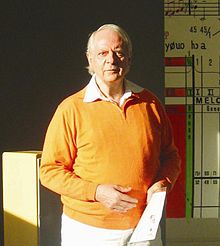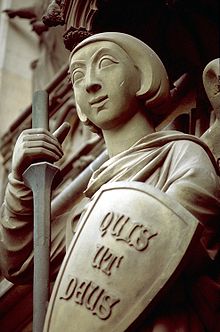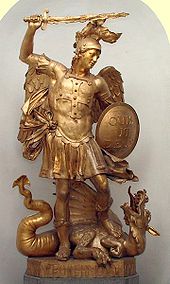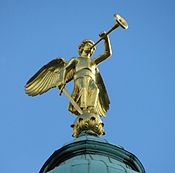- Donnerstag aus Licht
-
Donnerstag aus Licht (Thursday from Light) is an opera by Karlheinz Stockhausen in a greeting, three acts, and a farewell, and was the first of seven to be composed for the opera cycle Licht: die sieben Tage der Woche (Light: The Seven Days of the Week). It was written between 1977 and 1980, with a libretto by the composer.
Contents
History
Donnerstag was given its staged premiere on 15 March 1981 by the La Scala Opera in the Teatro alla Scala in Milan, but without the third act, which had to be omitted due to a strike by the opera chorus of La Scala. They had demanded soloists' bonuses because of one brief passage in act 3, and had been turned down by the management. Further performances without the third act followed on 18, 21, 24, and 27 March. An agreement was finally reached and the complete opera was finally performed on 3 April, with two further performances on 5 and 7 April (Kurtz 1992, 213). The stage direction was by Luca Ronconi, with costume and stage design by Gae Aulenti. Scenic realisation was by Giorgio Cristini, lighting by Vannio Vanni, light compositions (act 3) by Mary Bauermeister. Péter Eötvös conducted, and played the Hammond organ in act 3, scene 2. Karlheinz Stockhausen was the sound projectionist.
On 19 December 1981, Donnerstag was awarded the Premio Critica Musicale F. Abbiati for "best new work of contemporary music" (Stockhausen 1989a, 189).
A second staging was given by the Royal Opera, Covent Garden in London, on 16, 18, 20, 24, and 26 September 1985. The stage direction was by Michael Bogdanov, designed by Mari Bjornson, lighting and light compositions by Chris Ellis. Péter Eötvös conducted, and Stockhausen was the sound projectionist.
The second act, Michaels Reise um die Erde (Michael's Journey Around the Earth) was staged separately in 2008, by Carlus Padrissa of La Fura dels Baus, with stage direction by Roland Olbeter. It was performed by Marco Blaauw (trumpet), Nicola Jürgensen (basset horn), and musikFabrik, directed by Peter Rundel. Video was by Franc Aleu, dramaturgy by Thomas Ulrich, lighting by Frank Sobotta, and sound direction by Paul Jeukendrup. This was initially a production of the Wiener Taschenoper in collaboration with the Wiener Festwochen.
Donnerstag is an opera for 14 performers (3 voices, 8 instrumentalists, 3 dancers) plus a choir, an orchestra, and tapes. It was composed between 1977 and 1980. In the larger context of Licht, Thursday is Michael's day. Thursday's exoteric (primary) colour is bright blue, and its esoteric (secondary) colours are purple and violet (Stockhausen 1989a, 182; Stockhausen 1989b, 200). Thursday is also the day of plants (Stockhausen 1989b, 201).
Roles
Role Performer Premiere cast (La Scala, 1981) London cast (1985) Michael tenor Robert Gambill (act 1), Paul Sperry (act 3) Julian Pike (Frieder Lang on Wed. 18 Sept.) Michael trumpeter Markus Stockhausen Markus Stockhausen Michael dancer Michèle Noiret Michèle Noiret Eve soprano Annette Meriweather Annette Meriweather Eve basset horn Suzanne Stephens Suzanne Stephens Eve dancer Elizabeth Clarke Elisabeth Clarke Lucifer bass Matthias Hölle Nicholas Isherwood Lucifer trombonist Mark Tezak Michael Svoboda Lucifer dancer-mime Alain Louafi Alain Louafi Michael’s Accompanist pianist Majella Stockhausen Majella Stockhausen Invisible Choirs choir WDR Choir, Karlheinz Stockhausen, cond. (16-track recording) WDR Choir, Stockhausen, cond. (16-track recording) Clownesque Pair of Swallows clarinetists (2nd doubles basset horn) Alain Damiens, Michel Arrignon David Smeyers, Beate Zelinsky Two Boys soprano saxophonists Hugo Read, Simon Stockhausen Simon Stockhausen Old Woman actress Elena Pantano Messenger tenor Giovanni Mastino Penguins at the South Pole (act 2) orchestra Orchestra of the Teatro alla Scala, Péter Eötvös, cond. Orchestra of the Royal Opera, Covent Garden, Péter Eötvös, cond. Heavenly Choirs and Orchestra (act 3) choir and orchestra Orchestra and Choir of the Teatro alla Scala, Péter Eötvös, cond. Orchestra and Choir of the Royal Opera, Covent Garden, Péter Eötvös, cond. Synopsis
The time and place are universal.
Donnerstags-Gruß
The Thursday Greeting is performed in the foyer as the audience is arriving.
Act 1: Michaels Jugend
The first act consists of three scenes that follow one another without a break.
Scene 1: Kindheit
In "Childhood" Michael, a son of poor parents, demonstrates exceptional gifts. His father, a schoolteacher, teaches him to pray, hunt, shoot, and perform in theatre. From his mother he learns singing and merry-making, dancing—and seduction. His parents quarrel, and a younger brother, Hermannchen, dies in infancy. The mother goes mad, attempts suicide, and is hospitalised. The father turns to drink, and goes off to war.
Scene 2: Mondeva
In the forest, Michael encounters Mondeva (Moon-Eve), half woman, half bird, and falls in love with her. As he discovers how to control her music through erotic play, in a parallel scene Michael’s mother is being killed by a doctor in an asylum.
Scene 3: Examen
Michael undergoes a triple admission examination to the conservatory. First as a singer, then as a trumpeter, and finally as a dancer, he amazes the jury, who enthusiastically admit him.
Act 2: Michaels Reise um die Erde
In the second act, Michael undertakes a journey around the world in what is essentially a trumpet concerto with orchestra, performed in a huge rotating globe set against a starry firmament. There are seven "stations" along the way, at each of which the music takes on colour from the locale: Germany, New York, Japan, Bali, India, Central Africa, and Jerusalem. Michael's formula gradually evolves from a simple beginning form to increasingly florid extravagance, finally shattering into incoherent fragments in stations 5 and 6. When he reaches Central Africa, Michael hears a distant basset horn, and orders the globe to stop turning. Michael commands the earth to rotate in reverse as the seventh station, Jerusalem, is reached, and he begins a new process of rehabilitation in a therapeutic conversation with a double-bass player. Mondeva appears, and they perform a duet in which their melodic formulas merge and intertwine until each plays the other's formula. Two clownish clarinet players, costumed as a pair of swallows, mock and—together with the orchestral low brass, an emblem of Lucifer—"crucify" him, after which the act ends with a musical "ascension" in which the sounds of the trumpet and basset horn circle around until they are united in a trill (Kurtz 1992, 213–14; Kohl 1993, 209–12).
Act 3: Michaels Heimkehr
In the third act Michael—in his threefold manifestation as tenor, trumpeter, and dancer—returns to his celestial home.
Scene 1: Festival
As the invisible choirs sing all around, he is welcomed by Eve—also in threefold form as soprano, basset hornist, and dancer—five choirs (delegates from various parts of the Michael Universe), five orchestral groups, and a background string orchestra (Stockhausen 1989a, 412).
- "Meditation". Eve presents Michael with a gift of three plants, and another of three compositions of light:
- "First Light Composition: Chaos out of Colours"
- "Second Light Composition: Suns out of Chaos"
- "Third Light Composition: Chaos from Colours"
- Part 1: "Moons"
- Part 2: "Moons and Glassy Images"
- Part 3: "Starry Sky". The signs of the Zodiac appear, one after another, from Aquarius to Capricorn. Suddenly, an old lady steps forward and demands, "Why don't you all come home!" The choirs answer her: "There is no 'home'. Even angels are always on the move". Eve presents Michael with a final gift, a terrestrial globe as a souvenir of his journey around the earth. Lucifer appears, first as a gremlin who springs out of the globe and presents Michael with his own, smaller blue globe. Michael passes it around to the choir, which infuriates the gremlin, who makes threatening gestures and summons assistance.
- "Michael's Battle with the Dragon". Lucifer reappears in a second form, as a tap-dancing trombonist dressed as a torero with a black cape and hat, and the gremlin turns into a dragon. Michael gives battle and the dragon, wounded many times, sinks to the ground. Michael borrows the conductor's long baton to deliver the coup de grâce. The dragon tries one last time to rise, but falls on his belly. The trombonist, too, staggers and falls on his back, legs in the air.
- "Boys' Duet", played by two angelic soprano saxophonists.
- "Argument". A messenger arrives to announce that Lucifer is once again causing trouble. Lucifer reappears, now in triple form as a bass singer, a trombonist, and a dancer-mime, and taunts Michael, who dismisses him: "You have lost. You have corrupted your wisdom through your bitter irony, poisonous sarcasm now fills your heart. … You are no longer immortal, Lucifer! … Can't you just once allow us to celebrate a festival in peace?" Lucifer can only go away muttering in disgust, "You fool! You fool!" as the scene ends.
Scene 2: Vision
In a process of 15 cyclical transpositions, Michael explains (in threefold appearance as singer, trumpeter, and dancer), his experience and opposition to Lucifer.
Donnerstags-Abschied
The Thursday Farewell (also called "Michael's Farewell") is performed outside the opera house following the performance, by five trumpeters who begin as the last scene, Vision, is concluding. They are costumed as Michael and positioned on the rooftops or on balconies surrounding the square, floodlit like statues on a tower. They each repeat one segment of the Michael formula, with long pauses between repetitions, for about 30 minutes, withdrawing at the end in the order in which their respective segments occur in the formula (Stockhausen 1989a, 488).
Unsichtbare Chöre
The Invisible Choirs are played back in the theatre over eight channels throughout most of act 1, and again in act 3, scene 1, and is composed in such a way that they could never be sung by a choir live, in part because there are as many as 180 separate voices, and in part because of the demands of polyphonic synchronicity, exactness of intonation, and dynamic balance (Stockhausen 1996, 77). There are three texts sung in Hebrew ("Judgement Day" from The Ascent of Moses, "The End of Time" from the Apocalypse of Baruch, and a Hymn of Praise, "The Heavens Rejoice", from the Book of Leviticus), as well as a different passage from "The End of Time", sung in German (Stockhausen 1989a, 206–207).
Critical reception
The staged premiere of Donnerstag was very well-received in Italy, where it was awarded the Italian Music Critics' Prize for best new work in December 1981. The German press reception, on the other hand, was harsh and often ad hominem (Kurtz 1992, 214–16). The Covent Garden production in 1985 also provoked contrary points of view in the press, in part divided over the question of the music versus the theatrical conception. Paul Griffiths, writing in the Times, for example, found that "it contains much quite extraordinary music" but "the opera never for a moment works as the mystic revelation it pretends to be. … It is very wondrous to contemplate—wondrous, that is, when it is not just silly" (Griffiths 1985b). Andrew Porter, on the contrary, found the "variety of forces, forms, textures, and matter … a strength and a pleasure", and the "somewhat ramshackle construction saves the work from solemn pretentiousness. There's even a playful quality about much of it, although its essential seriousness is not in doubt and inner musical integrity is not compromised" (Porter 1985, 127). Porter concludes,
hearing and seeing the drama is an engrossing, enjoyable, and elevating adventure. Ear, mind, and spirit are engaged. And, as I suggested, moments of jokiness, naïveté—silliness, even—save the work from being unbearably solemn: Stockhausen-Sarastro has a vein of Papageno in him. There is a great deal to listen to and to watch. Some of the spans, especially in the last scene, are traversed slowly. But things happen; the music doesn't fall into simplistic repetitions or numbing stasis. There are counterpoints to follow. There are supple melodies and rich harmonies. There are wonderful sounds—new and stirring sounds. The score is a culmination of the marvellous musics—in whose making Michael's vision, Lucifer's technical skills, and the inspiration of Eve's love seem to have conspired—that have poured from Stockhausen during the last thirty years. … But what matters most now is the excitement of entering this huge, ambitious work, responding to its sounds and sights, trying to understand it, and feeling, perhaps, that it is—by intention at least—something like a Divine Comedy and a Comédie Humaine in one. (Porter 1985, 131)
Discography
- Stockhausen: Donnerstag aus Licht. Annette Meriweather (soprano); Robert Gambill, Michael Angel, Paul Sperry (tenors); Elizabeth Clarke, Alain Louafi (speakers); Markus Stockhausen (trumpet); Suzanne Stephens (basset horn); Alain Damiens (clarinet); Michel Arrignon (clarinet and basset horn); Hugo Read, Simon Stockhausen (soprano saxophones); Mark Tezak (trombone); Majella Stockhausen (piano); Ensemble InterContemporain; Choir of the West German Radio, Cologne; Hilversum Radio Choir; Péter Eötvös (conductor and Hammond organ); Karlheinz Stockhausen (conductor and sound projection). DG 2740 272 (4 LPs); DGG 423 379-2 (4CDs). Hamburg: Polydor International, 1983. Reissued Stockhausen Complete Edition, CD 33 A–D (4CDs). Kürten: Stockhausen-Verlag, 1992.
- Schöpfung und Erschöpfung. Musik in Deutschland 1950–2000. Mauricio Kagel; Karlheinz Stockhausen. CD. 74321 73635 2. [Munich]: BMG Ariola Classics, 2003. Includes Examen, act 1 scene 3 from Donnerstag aus Licht (Julian Pike, tenor; Markus Stockhausen, trumpet; Suzanne Stephens, basset horn; Majella Stockhausen, piano; Annette Meriweather, soprano; Nicholas Isherwood, bass; Elizabeth Clarke and Alain Louafi, speakers; Karlheinz Stockhausen, sound projection.
- Karlheinz Stockhausen: Unsichtbare Chöre / Invisible Choirs /Chœrs Invisibles vom / from / de Donnerstag aus Licht. West German Radio Chorus (prepared by Herbert Schernus, Godfried Ritter, Karlheinz Stockhausen); Suzanne Stephens (clarinets); Karlheinz Stockhausen (musical direction, sound projectionm and tape mixdown). DG (LP) 419432-1; CD 419 432-2. Hamburg: Polydor International, 1986. Reissued, Stockhausen Complete Edition CD 31. Kürten: Stockhausen-Verlag, 1992.
- Karlheinz Stockhausen: Michaels Reise um die Erde: Solisten-Version für einen Trompeter, 9 Mitspieler und Klangregisseur (1977/78). Markus Stockhausen (trumpet), Suzanne Stephens (basset horn), Ian Stuart (clarinet), Lesley Schatzberger (clarinet and basset horn), Michael Svoboda (trombone and baritone horn), Kathinka Pasveer (alto flute), Andreas Boettger (percussion), Isao Nakamura (percussion), Michael Obst, Simon Stockhausen (synthesizers), Karlheinz Stockhausen (sound projection). ECM New Series 1406 437 188-2 (Japan release CD POCC-1008). Munich: ECM Records GmbH, 1992.
- Karlheinz Stockhausen Musik für Klarinette, Baßklarinette, Bassetthorn: Suzee Stephens spielt 15 Kompositionen. With Kathinka Pasveer (alto flute), Joachim Krist (viola), Majella Stockhausen (piano), Julian Pike (tenor), Markus Stockhausen (trumpet), and Simon Stockhausen (synthesizer). (Includes Tanze Luzefa! for basset horn, Bijou for alto flute, bass clarinet, and tape, Mondeva for tenor and basset horn, and Mission unf Himmelfahrt for trumpet and basset horn, all from Donnerstag aus Licht.) Stockhausen Complete Edition CD 32 A–C (3 CDs). Kürten: Stockhausen-Verlag, 1994.
- Markus Stockhausen Plays Karlheinz Stockhausen. Markus Stockhausen (trumpet), Nick de Groot (double bass), Annette Meriweather (soprano). (Halt from Michaels Reise um die Erde, for trumpet and double bass; Aries fron Sirius, for trumpet and electronic music; In Freundschaft for trumpet; Pietà from Dienstag aus Licht for flugelhorn and soprano.) EMI Classics (CD) 5 56645 2. Cologne: EMI Electrola GmbH, 1998. Reissued Stockhausen Complete Edition CD 60. Kürten: Stockhausen-Verlag.
- Karlheinz Stockhausen: Bass Clarinet and Piano. Volker Hemken (bass clarinet), Steffen Schleiermacher (piano). (Tanze Luzefa!, from Michaels Jugend, act 1 of Donnerstag aus Licht; Klavierstücke VII, VIII, and IX; In Freundschaft for bass clarinet; Tierkreis for bass clarinet and piano, with toy piano and music box.) DG Scene (CD) MDG 613 1451-2. Detmold: Dabringhaus und Grimm Audiovision, 2007.
- Stockhausen: Michael's Farewell. John Wallace (trumpet), Andrew Powell (live electronics). (Karlheinz Stockhausen, Michael's Farewell from Donnerstag aus Licht; Andrew Powell, Plasmogeny II; Roger Smalley, Echo III; Tim Souster, The Transistor Radio of St. Narcissus.) Deux-Elles CD DXL 1039. Reading: Deux-Elles Limited, 2002.
- Tara Bouman, Klarinette, Bassetthorn: Contemporary. (CD) DeutschlandRadio Aktivraum AR 50101. Cologne: Aktivraum Musik, 2003. Includes Mission und Himmelfahrt from Michaels Reise um die Erde, from Donnerstag aus Licht, with Markus Stockhausen (trumpet).
Filmography
- Davies, Russell (presenter). 1985. Arts Review. Segment "Opera: Donnerstag by Karlheinz Stockhausen" includes studio discussion with Bernard Williams, Judith Weir, and Michael Nyman, and a filmed interview with Stockhausen by Peter Heyworth. BBC2 (21 September, 7:40–8:30pm).
- Examen vom Donnerstag aus Licht. José Montes-Baquer, dir. Cologne: WDR, 1990.
- Michaels Reise um die Erde. Markus Stockhausen (trumpet), Symphony Orchestra of the RAI Rome, Karlheinz Stockhausen (cond.). Rome: RAI, 1979.
- Michaels Reise um die Erde. Soloists’ Version. Cologne: WDR, 1990.
- Michaels Reise um die Erde. Marco Blaauw (Michael, trumpet), Nicola Jürgensen (Eve, basset horn), Carl Rosman and Fie Schouten (Swallow pair, clarinets). Carlus Padrissa, stage director. Roland Olbeter, art director. Chu Uroz, costumes. MusikFabrik, Peter Rundel, conductor. Thomas Ulrich, script editor. János Darvas, director. WDR for Wiener Festwochen, 2009.
References
- Adamenko, Victoria. 2007. Neo-mythologism in Music: From Scriabin and Schoenberg to Schnittke and Crumb. Interplay Series 5. Hillsdale, NY: Pendragon Press. ISBN: 157647125X
- Bandur, Markus. 2004. "'...alles aus einem Kern entfaltet, thematisch und strukturell'. Karlheinz Stockhausen und die Rezeption des Urantia Book in LICHT". In Internationales Stockhausen-Symposion 2000: LICHT: Musikwissenschaftliches Institut der Universität zu Köln, 19. bis 22. Oktober 2000. Tagungsbericht. Signale aus Köln: Musik der Zeit 10. Ed. Imke Misch and Christoph von Blumröder, 136–46. Münster, Berlin, London: Lit Verlag. ISBN 3-8258-7944-5.
- Britton, Peter. 1985. "Stockhausen's Path to Opera". The Musical Times 126, no. 1711 (September): 515–21.
- Bruno, Pascal. 1999. "Donnerstag aus Licht: A New Myth, or Simply an Updating of a Knowledge?" Perspectives of New Music 37, no. 1 (Winter):133–56.
- Courir, Duilio. 1981. "Stockhausen, il diavolo e il paradiso: Alla Scala tra fischi e applausi Donnerstag integrale". Corriere della Sera (5 April). Reprinted in Stockhausen 70: Das Programmbuch Köln 1998, edited by Imke Misch and Christoph von Blumröder, 148–49. Signale aus Köln: Beiträge zur Musik der Zeit 1. Saarbrücken: PFAU-Verlag, 1998. ISBN 3-89727-047-1
- Dirmeikis, Paul. 1999. Le Souffle du temps: Quodlibet pour Karlheinz Stockhausen. [La Seyne-sur-Mer]: Éditions Telo Martius. ISBN 2-905023-37-6 "[1]".
- Fürst, Christian. 2008. "Jubel für Stockhausens «Michaels Reise» in Wien". Schwäbische Zeitung (13 May).
- Glossner, Herbert. 1981. "Michael grüßt die Menschenkinder: Stockhausen an der Scala: Donnerstag aus Licht". Deutsches Allgemeines Sonntagsblatt (29 March). Reprinted in Stockhausen 70: Das Programmbuch Köln 1998, edited by Imke Misch and Christoph von Blumröder, 150–52. Signale aus Köln: Beiträge zur Musik der Zeit 1. Saarbrücken: PFAU-Verlag, 1998. ISBN 3-89727-047-1
- Godwin, Joscelyn. 1998. "Stockhausen's Donnerstag aus Licht and Gnosticism". In Gnosis and Hermeticism from Antiquity to Modern Times, SUNY Series in Western Esoteric Traditions, edited by Roelof van den Broek and Wouter J. Hanegraaff, 347–58. Albany: State University of New York Press. ISBN 079143611X (cloth) ISBN 0791436128 (pbk).
- Griffiths, Paul. 1980. "Holland Festival: Stockhausen in the Clouds". The Times (17 June): 13.
- Griffiths, Paul. 1982. "Stockhausen: Riverside Studios". The Times (10 May): 7.
- Griffiths, Paul. 1985a. "Staging a Week to Remember". The Times (14 September): 18.
- Griffiths, Paul. 1985b. "A Great Creative Mind Talks to Itself". The Times (18 September): 15.
- Gutknecht, Dieter. 1995. "Stockhausen und Japan". In Lux oriente: Begegnungen der Kulturen in der Musikforschung—Festschrift Robert Günther zum 65. Geburtstag, edited by Uwe U. Pätzold, Kyo-chul Chung, and Klaus Wolfgang Niemöller, 271–84. Kölner Beiträge zur Musikforschung 188. Regensburg: Gustav Bosse. ISBN 3-7649-2620-1.
- Kenyon, Nicholas. 1980. "Musical Events: Seven Days' Wonder". The New Yorker (25 August): 78–81.
- Knessl, Lothar. 2008. "Weltschöpfer: Karlheinz Stockhausen (1928–2007)—Michaels Reise (1978), II. Akt vom Donnerstag aus Licht". Österreichische Musikzeitschrift 63, no. 5 (May): 11–15.
- Koch, Gerhard R. 1981. "Streik verhindert Welterlösung". Frankfurter Allgemeine Zeitung, no. 65 (18 March): 25.
- Kohl, Jerome. 1983–84a. "The Evolution of Macro- and Micro-Time Relations in Stockhausen's Recent Music". Perspectives of New Music 22, nos. 1 and 2:147–85.
- Kohl, Jerome. 1990. "Into the Middleground: Formula Syntax in Stockhausen's Licht". Perspectives of New Music 28, no. 2 (Summer): 262–91.
- Kohl, Jerome. 1993. "Time and Light." Contemporary Music Review 7, no. 2:203–19.
- Kovács, Adorján F. 2008. "Dauer, Form und Leben: Zur Konzeption und Rezeption von Karlheinz Stockhausens Licht". In Gedenkschrift für Stockhausen, edited by Suzanne Stephens and Kathinka Pasveer, 87–112. Kürten: Stockhausen-Stiftung für Musik. ISBN 978-3-00-023528-3
- Kurtz, Michael. 1992. Stockhausen: A Biography, translated by Richard Toop. London and Boston: Faber and Faber. ISBN 0571143237 (cloth) ISBN 0-571-17146-X (pbk).
- Maconie, Robin. 2005. Other Planets: The Music of Karlheinz Stockhausen. Lanham, Maryland, Toronto, Oxford: The Scarecrow Press, Inc. ISBN 0-8108-5356-6.
- Mann, William. 1981. "Exciting Opera by Stockhausen: Donnerstag, La Scala, Milan". The Times (18 March): 11.
- Misch, Imke. 2004. "Serielles Denken in Licht". In Internationales Stockhausen-Symposion 2000: LICHT. Musikwissenschaftliches Institut der Universität zu Köln, 19. bis 22. Oktober 2000. Tagungsbericht, edited by Imke Misch and Christoph von Blumröder, 36–51. Münster: Lit-Verlag. ISBN 3-8258-7944-5.
- Monna, Marialisa. 1981. "Un seminario di Karlheinz Stockhausen". Nuova Rivista Musicale Italiana 15, no. 4 (October–December): 642–48.
- Pestelli, Giorgio. 1981. "Scala: nel cuor della notte il 3° atto di Stockhausen con applausi e anche fischi". La Stampa no. 81 (5 April): 21.
- Porter, Andrew. 1985. "Musical Events: Thursday Splendor". The New Yorker (21 October): 127–28, 131–32.
- Restagno, Enzo. 1981. "Stockhausen vibrante e astrale (e mutilato dallo sciopero del coro)". La Stampa, 115, no. 74 (16 March): 27.
- Riethmüller, Albrecht. 1985. "Michael im Himmel wie auf Erden: Zu Karlheinz Stockhausens Donnerstag aus Licht". In Oper heute: Formen der Wirklichkeit im zeitgenössischen Musiktheater, edited by Otto Kolleritsch, 117-135. Studien zur Wertungsforschung 16. Graz: Institut für Wertungsforschung, Graz. ISBN 3702401709.
- S., N. 1981. "Quel «terzo atto» alla Scala". La Stampa 115, no. 92 (3 April): 3.
- Schwerdtfeger, Dettloff. 2000. Karlheinz Stockhausens Oper Donnerstag aus Licht: Ziel und Anfang einer kompositorischen Entwicklung. Kürten: Stockhausen-Stiftung für Musik. ISBN 3-00-006030-8.
- Sinigaglia, Alberto. 1981. "Il debutto mondiale, senza l'ultimo atto per la protesta del coro". La Stampa 115, no. 63 (15 March): 21.
- Smalley, Roger. 1985. "Music in London: Opera: Donnerstag". The Musical Times 126, no. 1713 (November): 679.
- Stockhausen, Karlheinz. 1989a. Texte zur Musik, vol. 5, edited by Christoph von Blumröder. DuMont Dokumente. Cologne: DuMont Buchverlag. ISBN 3-7701-2249-6.
- Stockhausen, Karlheinz. 1989b. Texte zur Musik, vol. 6, edited by Christoph von Blumröder. DuMont Dokumente. Cologne: DuMont Buchverlag. ISBN 3-7701-2249-6
- Ulrich, Thomas. 2004. "Moral und Übermoral in Stockhausens Licht".In Internationales Stockhausen-Symposion 2000: LICHT. Musikwissenschaftliches Institut der Universität zu Köln, 19. bis 22. Oktober 2000. Tagungsbericht, edited by Imke Misch and Christoph von Blumröder, 74–88. Münster: Lit-Verlag. ISBN 3-8258-7944-5.
- Ulrich, Thomas. 2008. "Anmerkungen zu Luzifer". In Gedenkschrift für Stockhausen, edited by Suzanne Stephens and Kathinka Pasveer, 202–11. Kürten: Stockhausen-Stiftung für Musik. ISBN 978-3-00-023528-3.
- Wirtz, Markus. 2000. Licht. Die szenische Musik von Karlheinz Stockhausen. Eine Einführung. Saarbücken: Pfau-Verlag. ISBN 3897270889
External links
Categories:- Compositions by Karlheinz Stockhausen
- 20th-century classical music
- Operas
- 1980 operas
- German-language operas
- La Scala world premieres
Wikimedia Foundation. 2010.




